"Aging In Place" and the "Forever Home"
chisue
4 years ago
Featured Answer
Comments (67)
blfenton
4 years agoFeathers11
4 years agoRelated Discussions
Forever Home Floor Plan - Advice & Opinions Appreciated
Comments (32)How long is forever? I can describe a couple forevers -- here's my grandparents' forever: - When my grandparents married, they built a small house on family land in the country (with an eye towards adding on as they could afford it), and they intended to live in that house forever. - When their oldest child graduated from high school, they opted to move to the big city 1) so she could attend university and live at home. 2) so they could start a business. They bought a very nice house and intended to live in it forever. - My grandfather died, my grandmother remarried, and the neighborhood showed signs of going downhill. So my grandmother and her new husband moved into a small condo that they thought would be ideal for a retired couple forever. - After a couple years, my grandmother felt restricted in the small space, so they bought a large ranch house and intended to live in it forever. My grandfather did, but after his death my grandmother didn't like upkeep on the large house, so she moved to a smaller ranch with the intention of staying in that compact house forever. - When she was 99 years old, she moved in with her son, who added a lovely little apartment to his house. And she did stay in that forever. And my mom's forever: - After she married, my mom moved into the house in the country where she'd been raised (my grandparents had rented it when they moved to the city). She intended to stay there forever. - She divorced, remarried, and her new husband wanted to live in the mountains. So they did, and they say they intend to stay in that house forever. I suspect my stepfather will live there the rest of his life (he's not in the best of health). - I think my mom'll leave the mountains after he dies. She's going to want to be nearer family. See how unexpected life events change your "forever"? My husband and I are building what we expect to be "forever". We've just turned 50 and our kids are almost out the door, so we're in a better position than a younger couple to say "forever" ... still, do we know? Not really. Likely most of our big life changes have already happened -- small kids, teens, now it's just us. We're building with an eye towards aging-in-place, but we also know that we could potentially end up selling....See MoreBuilding a forever home a family of 3.
Comments (51)Well, I'm in my late sixties, hubby is in late seventies, and we're delighted with our single story house :) Smallish master bedroom (but BIG shower) for us, plus two spare bedrooms, one of which is the guest bedroom and the other of which is our gym/music room. We also have a TV room/library. Decent sized kitchen, with lots of storage (so much that I almost never have to climb onto a step ladder to reach things up top). All rooms are used every day (except the guest bedroom, although hubby has been known to have an afternoon nap there). Incidentally, in the 2 1/2 years we've lived in the house, we've had family visiting overnight precisely twice. The kids are spread out across the country, pursuing their different careers/businesses, and the grandkids are starting to scatter as well as they go on to their own schools and careers. People are much more mobile than a couple of generations ago, and that's the reality of today's world. I wouldn't build an oversized house to accommodate guests who may never come. What I'm saying here is that your house should be designed around your life, your interests, your needs for today and the immediate future; they shouldn't be designed around someone else's view of what is idyllic (just see the arguments for and against baths/showers or wood/tile floors on other threads!)...See MoreForever home- looking for feedback on plans
Comments (27)"Forever" is tricky. - If you're already in your 50s or older, your chances of actually staying in your house "forever" are better. If you're still young and are young in your career, so many things can prompt you to move: a better job, a certain school district, the need for more space as more children arrive. - "Forever" is more less likely if you're in a neighborhood. Neighborhoods can change (for better or for worse). For example, I live in a neighborhood of big, all-brick ranches on large lots which were all built around 1970 -- lots of these houses are still occupied by the original owners. However, LOADS of new neighborhoods have popped up around us ... and those new houses are more stylish, have community pools, and their small lots appeal to people who don't want lots of yard work ... we are slowly becoming a rental community. - Of course, "forever" is possible: My grandparents were married around 1930, and in their second year of marriage they built a farmhouse, where they raised their children ... and my mother raised us ... and my brother is now raising his children. The house has seen three additions and two kitchen remodels. My grandmother didn't live in it 'til the end of her life, but someone in the family has continued to live in it. This makes wise planning even more important. An elevator or closets that can be converted to house an elevator make great sense. You can also plan the second floor or basement so that they could be converted into an apartment for a caregiver at a later time. Similar options: Build a one-story ranch ... or a house with everything you'd need on the first floor /guest bedrooms upstairs. That makes more sense to me than an elevator. Personally, we are going with a two-story house ... just as you suggest, with an upstairs that could be for an adult family member or a caregiver. The upstairs will allow for privacy, and those bedrooms will have closets and a bathroom appropriate for adults. The boiler rusted out today. Fortunately while the repair guru was there helping me start it up for the winter. Our son happened to pop up for a visit, too; I promised him we'd move to a condo before we are 85. Condos do have fewer maintenance issues, but things will still need maintenance and repair ... and condos come with their own set of aging-in-place issues: - You're less likely to have a comfortable garage entry, and getting in/out of the house matters to elderly people. - You're less likely to have an elder-friendly bathroom. Instead of saying you'll limit yourself to condos, it might be better to say you'll set yourself up in a low-maintenance place ... condo or not....See MoreWhere's the thread about staying in your house?
Comments (28)My parents already had the trash service coming to their garage door to pick up, for an additional quarterly fee. But, they won’t enter the garage, liability issues. The carts had to be wheeled out of the garage. (And no, the carts couldn’t stay outside the garage, because of ease of putting the trash in and to prevent critters from getting in. If it’s easy for you, it’s easy for a raccoon! Back in the early 60s, my grandmother’s mailbox was at the end of the lane, on the main road. When her ALS kept her from walking all that way, she talked to her mailman, and moved her box to the foot of her driveway. Some years later, it moved to where the front walk met the stoop. Then to the stoop. Then, the mailman rang the doorbell and waited for her to answer the door. So it was a combination wellness check/mail delivery. My parents had caregivers who were afraid to go to their mailbox, because they had seen deer in the woods. DMIL moved to a condo building after her heart attack 22 years ago. She does have to make the trip to the common mailroom for her mail, but it is everyone’s opportunity to see one another....See Moremaifleur01
4 years agoElmer J Fudd
4 years agoFeathers11
4 years agomaifleur01
4 years agoMichael
4 years agoElmer J Fudd
4 years agomaifleur01
4 years agoAnglophilia
4 years agoElmer J Fudd
4 years agolast modified: 4 years agoMichael
4 years agochisue
4 years agodedtired
4 years agomaifleur01
4 years agomaire_cate
4 years agolast modified: 4 years agoUser
4 years agoUser
4 years agoblfenton
4 years agolast modified: 4 years agomaire_cate
4 years agoAnglophilia
4 years agolast modified: 4 years agoElmer J Fudd
4 years agochisue
4 years agoblfenton
4 years agolast modified: 4 years agostacey_mb
4 years agoUser
4 years agomarilyn_c
4 years agoZalco/bring back Sophie!
4 years agoZalco/bring back Sophie!
4 years agoblfenton
4 years agoElmer J Fudd
4 years agoElmer J Fudd
4 years agochisue
4 years agoUser
4 years agoUser
4 years agoElmer J Fudd
4 years agolast modified: 4 years agochisue
4 years agoyeonassky
4 years agoUser
4 years agoElmer J Fudd
4 years agomaifleur01
4 years agolast modified: 4 years agochisue
4 years agoblfenton
4 years agomaifleur01
4 years agoElmer J Fudd
4 years agolast modified: 4 years agoMichael
4 years agochisue
4 years agolast modified: 4 years agomaifleur01
4 years agomaire_cate
4 years ago
Related Stories
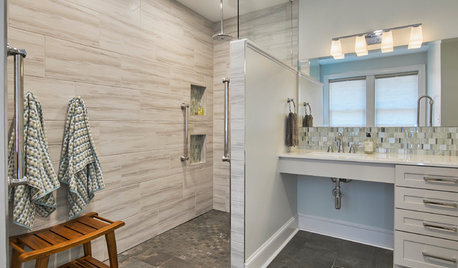
UNIVERSAL DESIGNIs Your Home Accessible for Aging in Place?
Review our checklist to find out if your house will work for you and your family as you get older
Full Story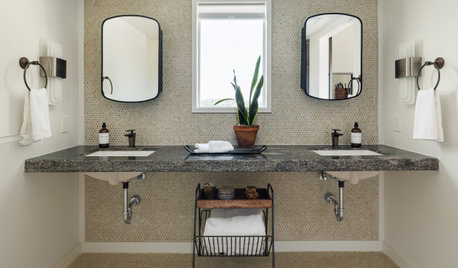
BATHROOM DESIGNBathroom of the Week: Master Bath Remade for Aging in Place
A designer helps a couple nearing retirement age turn a house into their forever home
Full Story
UNIVERSAL DESIGN12 Must-Haves for Aging in Place
Design a home that will continue to be accessible, safe and stylish as the years go by
Full Story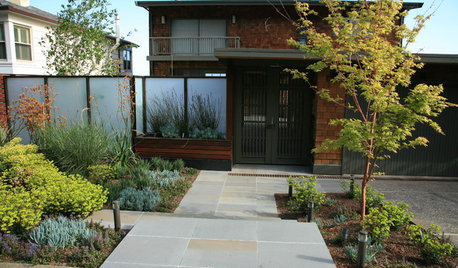
UNIVERSAL DESIGNAging-in-Place Resolutions for the New Year
How to make your home help you age gracefully right where you are
Full Story
BATHROOM DESIGNBathroom of the Week: A Serene Master Bath for Aging in Place
A designer helps a St. Louis couple stay in their longtime home with a remodel that creates an accessible master suite
Full Story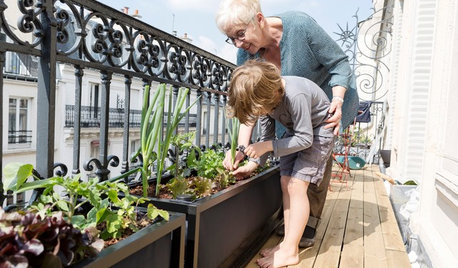
UNIVERSAL DESIGN10 Questions to Ask Before Sharing Your Home With Aging Parents
Honest conversation is key to deciding whether it makes sense to have your parents move in with you
Full Story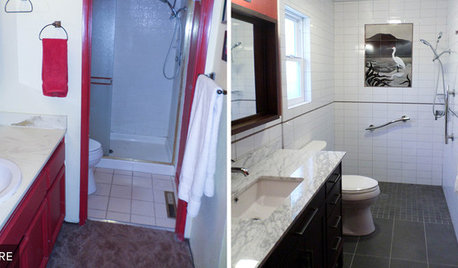
BATHROOM MAKEOVERSReader Bathroom: $22,000 Remodel for Aging in Place in California
A 71-year-old prepares for the future by creating a bathroom that will work as she gets older — and be stylish as well as functional
Full Story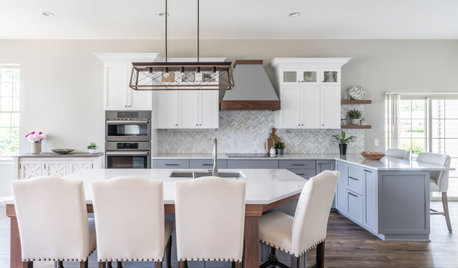
KITCHEN DESIGN10 Ways to Design a Kitchen for Aging in Place
Design choices that prevent stooping, reaching and falling help keep the space safe and accessible as you get older
Full Story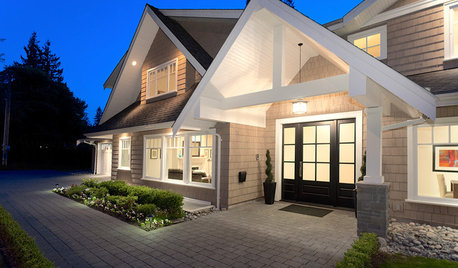
UNIVERSAL DESIGNWhat to Look for in a House if You Plan to Age in Place
Look for details like these when designing or shopping for your forever home
Full Story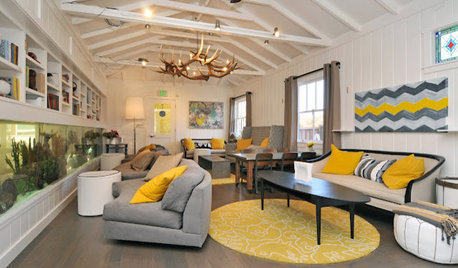
MORE ROOMSPlay-Space Secrets for All-Ages Homes
Don't let a generation gap put holes in your interior design. These tips from family-friendly businesses can give your rooms all-ages appeal
Full Story



blfenton